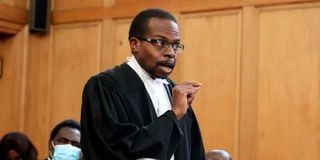Premium
Verdict on BBI attracts fourth lawsuit as Charles Kanjama files case

Lawyer Charles Kanjama at the Court of Appeal, Nairobi, on June 2, 2021 during the hearing of appeals on the Building Bridges initiative.
What you need to know:
- Mr Kanjama intends to challenge the appellate court’s decision to decline to order the return of the public funds spent on the promotion of the unconstitutional process of amending the Constitution, as conducted by the BBI Steering Committee.
Nairobi-based lawyer Charles Kanjama has lodged an appeal seeking the endorsement and setting aside of some findings of the appellate court regarding the Building Bridges Initiative (BBI).
Mr Kanjama's case raises the number of appeal to four, the other appellants being Attorney-General Kihara Kariuki, the Independent Electoral and Boundaries Commission (IEBC) and lawyer Omoke Morara.
Mr Kanjama intends to appeal against five findings of the Court of Appeal and at the same time seek the affirmation of nine others.
He intends to challenge the appellate court’s decision to decline to order the return of the public funds spent on the promotion of the unconstitutional process of amending the Constitution, as conducted by the BBI Steering Committee.
In its judgment, the appellate court upheld the High Court’s decision to dismiss the request for an order directing the Attorney-General to ensure public officers who authorised use of public funds on the BBI to make refunds.
Basic structure doctrine
The lawyer is also appealing against the appellate court’s finding that the basic structure of the Constitution can only be altered through a model described as primary constituent power.
It includes four sequential steps listed as civic education, public participation and collection of views, constituent assembly debate and, ultimately, a referendum.
Mr Kanjama wants the apex court to affirm that the basic structure doctrine is applicable in Kenya.
He is also challenging the position of the Court of Appeal that civil proceedings can be instituted against the President or a person performing the functions of the office of the President during their tenure, in respect of anything done or not done contrary to the Constitution.
Another finding that Mr Kanjama intends to fight is that the Constitution of Kenya Amendment Bill, 2020, cannot be subjected to a referendum in the absence of evidence of continuous voter registration by the IEBC.
He is further aggrieved by the court’s decision to set aside two declarations made by the High Court bench on the BBI.
The first declaration was that Article 257(10) of the Constitution requires all specific proposed amendments to the Constitution be submitted as separate and distinct referendum questions.
The other was that the BBI Steering Committee established by President Uhuru Kenyatta is an unconstitutional and unlawful entity.
Authority matter
Mr Kanjama further wants the Supreme Court to affirm nine findings by the Court of Appeal.
They include a finding that the President does not have authority under the Constitution to initiate amendments to it.
He urges the Supreme Court to affirm that a constitutional amendment can only be initiated by Parliament, through a parliamentary initiative (under article 256) or through a popular initiative (under article 257).
In addition, the lawyer wants an affirmation that the BBI Steering Committee has no legal capacity to initiate any action towards promoting constitutional changes.
Another affirmation sought by the lawyer is that the BBI Bill –Constitution of Kenya Amendment Bill (2020) – is unconstitutional and an usurpation of the people’s exercise of sovereign power.
Further, he wants an affirmation that the IEBC lacked the requisite quorum for carrying out its business relating to the conduct of the referendum proposed in the BBI, including verification of signatures collected in support of the amendment Bill.





